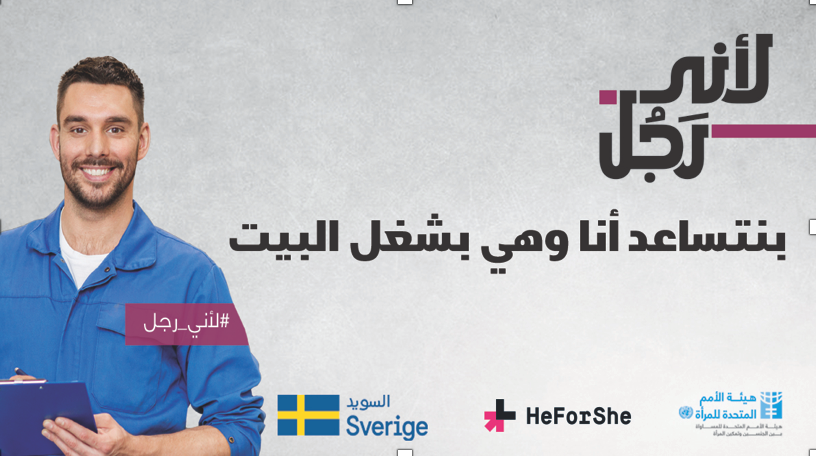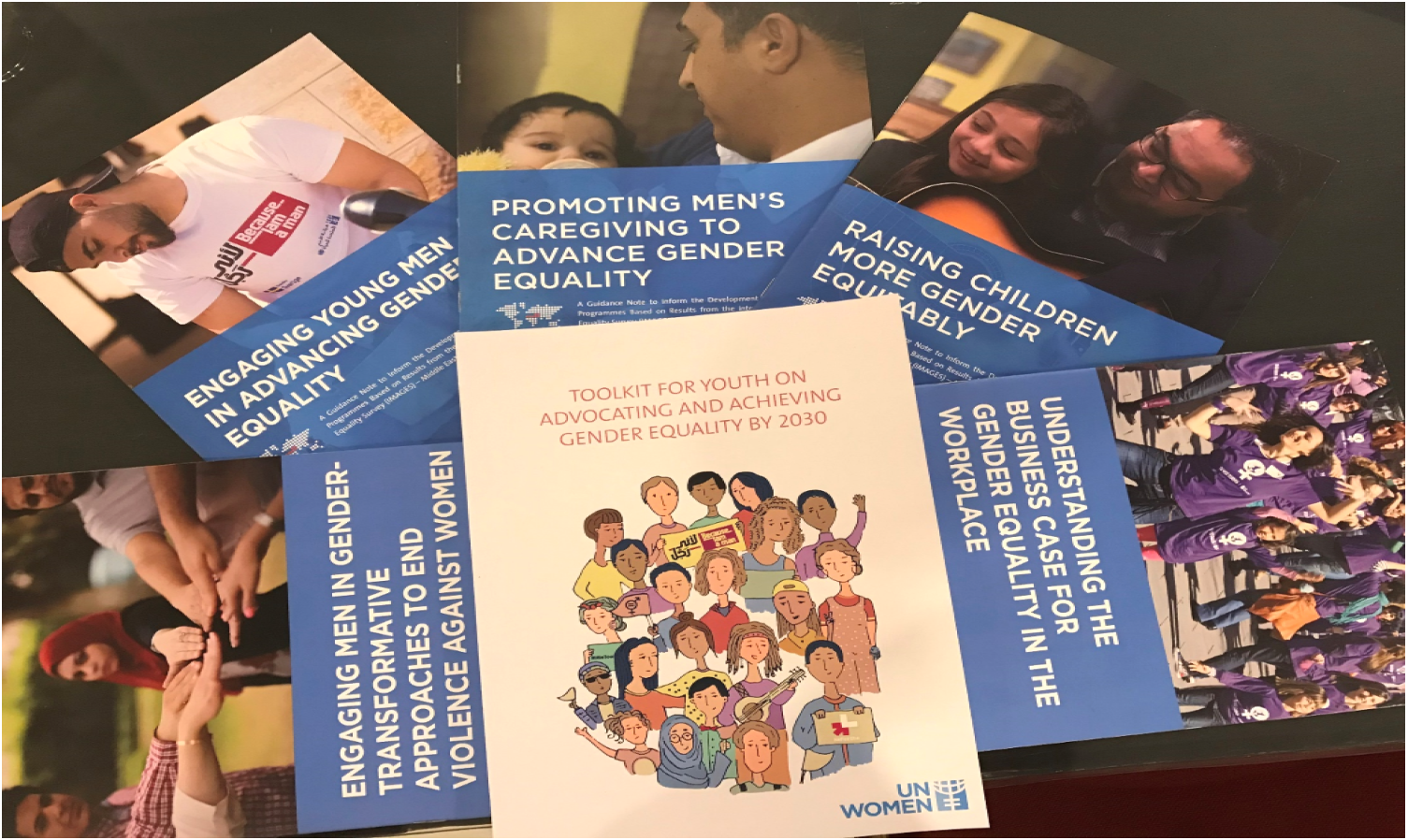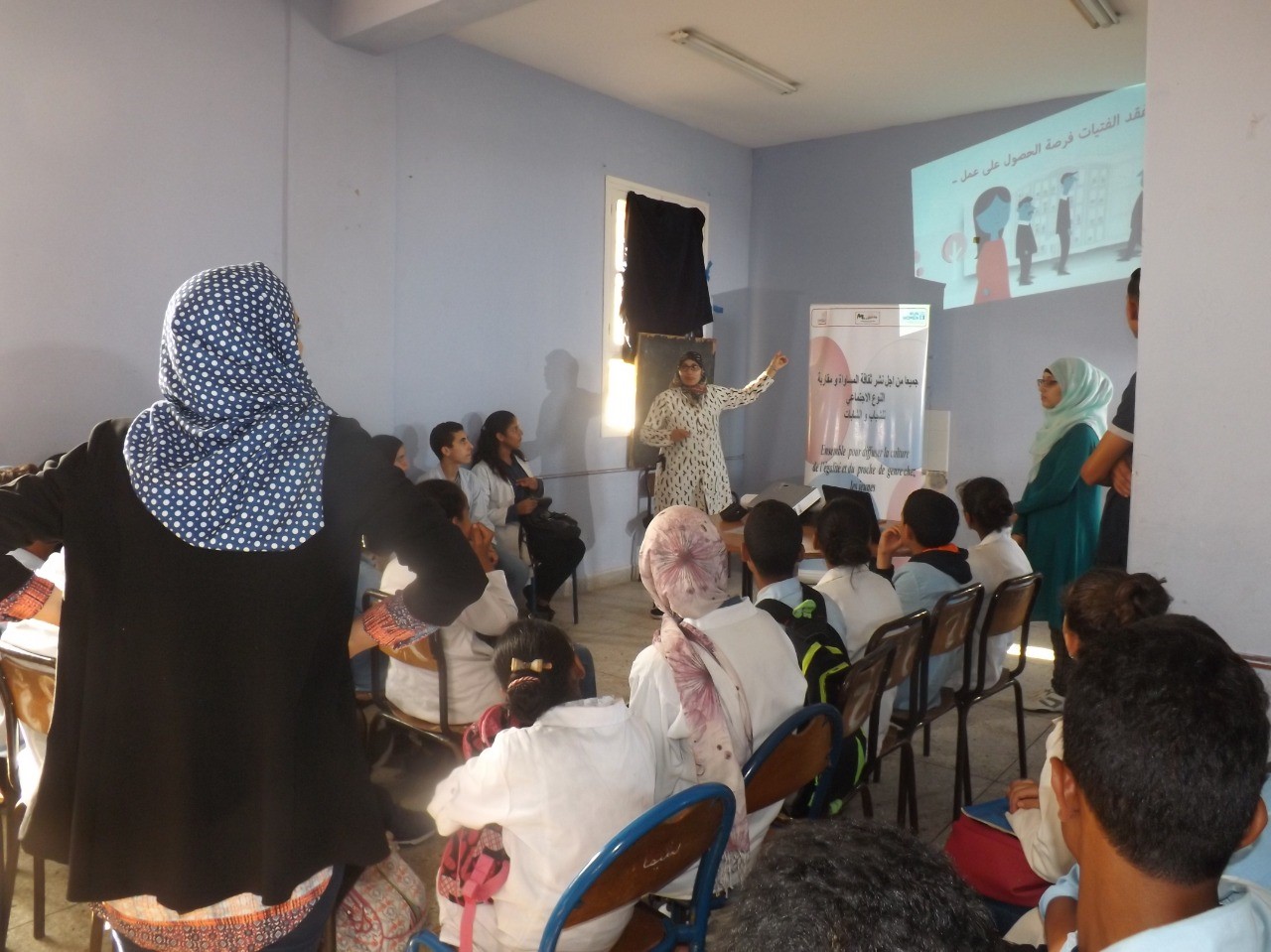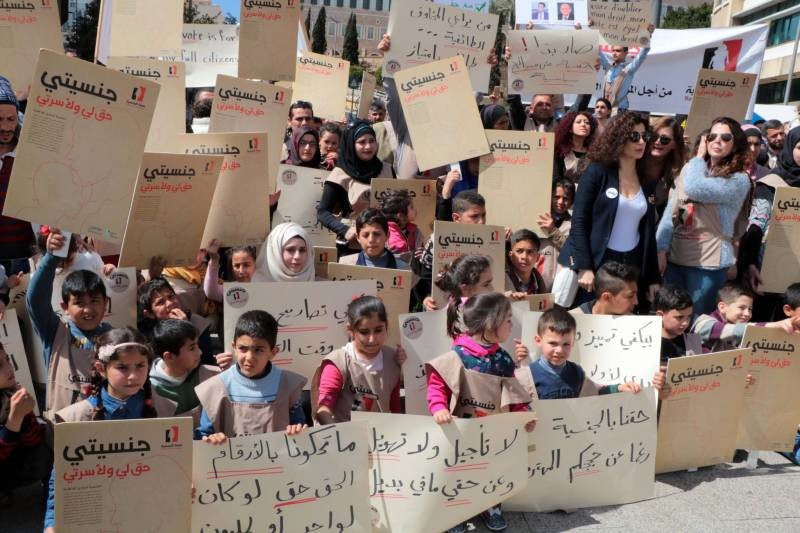Case study (number one) on the Regional Programme Men and Women for Gender Equality, implemented by UN Women Regional Office for Arab States, funded by Sida
Date:

There have been significant advances for gender equality in the Middle East and North Africa (MENA) region although much more remains to be achieved. Gender discriminatory laws and policies are still in place in many countries and men frequently control political and leadership spaces and to a large extent the daily lives of women and girls. Yet little is known about men’s attitudes on gender and masculinities.
It is against this background that UN Women’s Government of Sweden funded, Men and Women for Gender Equality Programme (2015-2018) seeks to better understand the root causes of gender inequalities in the Arab States and to address them through an innovative bottom-up approach, including through emphasizing the engagement of men and boys for gender equality, in a manner that is accountable and accountable to women and girls. The programme has a specific focus on Egypt, Lebanon, Morocco and Palestine, and for its second phase, engagement will be extended to Jordan and Tunisia phase (2019-2021).
As a first step in the programme, between 2015 and 2017, UN Women, Promundo and national partners undertook the International Men and Gender Equality Survey (IMAGES) across the four programme countries[1]. Key findings from this first study of its kind in MENA show that a majority of the men interviewed support traditional patriarchal attitudes and believe a woman’s most important role is to care for the household. Unlike other parts of the world, interviews suggest that younger men are just as unwilling to change these roles as older ones.
The IMAGES MENA has been cited in more than 475 media outlets, including in the Economist and the Guardian with an estimated outreach of 1.48 billion persons globally. Its finding have been widely discussed and debated in national, regional and international meetings such as the Development Talks at Sida HQ in Stockholm (2017), a CSW 62 (2018) side event and a side event at the Human Rights Council (2018).
Based on the research findings and recommendations, programme and advocacy tools have been developed to shape and inform community based and national level programmes to engage men and boys in gender equality in partnership with women and girls.
Advocacy and Communications
Depending on the audience, research and findings from the programme have been disseminated through social media, reports, infographics, documentary, drama and virtual reality films[2]. Over 60 products were developed and campaigns initiated, with the aim of informing policy and programming, and eliciting behavioural change.
Policy and programme briefs on fatherhood and care; young men and gender equality; gender socialization and engaging men and boys in preventing violence against women[3] have inspired policy dialogues with government officials and other key stakeholders. As examples, the National Council for Women in Egypt has integrated the engagement of men and boys for gender equality in the National Women Empowerment Strategy-Vision 2030; Infographics from IMAGES MENA were used in a national campaign on women’s political participation in Lebanon.

Cartoon from Morocco, illustrating the IMAGES research findings
In addition, UN Women built the advocacy campaign, Because I am a Man, launched in November 2017around IMAGES MENA recommendations. The campaign aims to challenge gender stereotypes and raise awareness on the positive roles men can play in achieving gender equality. The campaign was launched on social media by UN Women and the National Council for Women in Egypt in November 2017 and it endorsed by many celebrities including the Egyptian footballer Mohammad Salah (a role model for boys and girls in the region and globally, with over 10m Facebook followers) and the Tunisian actor Dhafer L’Abidine. A 12-week digital, Because I am a man campaign was, thereafter, launched in Morocco, with five videos illustrating the main IMAGES findings through messages about positive masculinities endorsed by Moroccan celebrities. Videos of this campaign were also disseminated weekly through social media and TV channels reaching over 500000 viewers. In Palestine, 12 billboards with “Because I Am a Man” messages were developed, and a song was produced for the campaign and performed by the young Palestinian singer, Bashar Murad[4].

Because I am a man I share household work – Palestine (one of the billboards)
The regional campaign engaged many audiences and generated a heated debate around changing gender roles.
“#Because_Iam_a_Man I reject violence against women whether verbally or physically. #Because_Iam_a_Man I reject marginalizing women in society and confine her role to only domestic work . #Because_Iam_a_Man I stand against child marriage and encourage women’s education and employment. Women play a great role in the growth and development of the society, and men should be engaged to advance this” A Man from Egypt tagged the campaign and developed these messages.
As examples, during a youth conference in Nairobi in December 2017 the findings were debated by over 500 young men and women, and youth were engaged to write about the IMAGES MENA research findings on Wikipedia during an edit-a-thon. National youth consultations on the findings were rolled out across the programme countries, and these generated community based recommendations on addressing gender inequalities and to further strengthen the campaign.


HerStory edit-a-thon, Cairo. Photo credit: UN Women/Emad Karim
The Because I am a man campaing inspired the Because I am a father campaign. Working with fathers proved to be an excellent entry point for engaging men in gender equality. According to the IMAGES MENA the majority of the men surveyed want to spend more time with their children. Fatherhood photo exhibitions were launched in collaboration with the Government of Sweden and often with the Swedish Dads exhibition[5]. In Egypt, this was complimented with an art exhibition of 10 prominent painters (men) and one photographer on the fatherhood theme.
The fatherhood campaign will be scaled up in phase II of the programme, with a new communication and advocacy strategy that will include advocacy asks on parental and paternal leave.

Community based interventions and national level programmes
Inspired by the IMAGES MENA and the Because I am a man campaign, a total of 41 civil society organizations (CSOs)[6], have been testing community owned interventions and leading communities in taking actions to decrease gender inequalities by addressing social norms through the engagement of men and boys in partnership with women and girls: those include engaging men in fatherhood and care: working with children and youth on gender equality issues through art, theatre, sports, etc., and working with men to prevent gender- based violence and promote women’s economic empowerment and rights to inheritance. UN Women has emerging evidence of changes in attitudes and behaviours through these intervention at an individual level, and some changes at the community and organisational level.
For example, Sharek Youth Organization in Palestine conducted training for fathers through a local community-based organization. One father stated: “As a result of the training, I treat my boys and girls equally and I help both of them with their homework.”
Another father said: “My father never taught me, and he did not accept a woman going to the city without a man. This has to stop, and I will be the harbinger of change.”
Others variously said: “When my wife is busy, I do housework and vice versa,” or “We have to change the society toward accepting gender equality. There have to be partnerships between women and men.” Sharek Youth Organisation also introduced paternal leave as an organisational policy as a result of their partnership with UN Women.
However, these testimonies need to be corroborated with their partners and children.
FE-MALE, a feminist organisation in Lebanon new to work on engaging men and boys in gender equality, have now integrated these ideas into their work after participating in the programme. “I have realised that achieving gender equality will be very difficult without engaging men. Men are not the enemy. We need to work with them” Mariam Khodari, Project coordinator, FEMALE.

The Association Mhasshass pour le Developpement Humain, as one of a portfolio of activities rolled out, conducted a training on gender equality in high schools in Morocco “We’ve taken 24 young men and trained them to become training facilitators. These young men had originally been particularly resistant to our discussions on gender roles and domestic violence. They thought a woman staying at home to cook was natural, and domestic violence was a private affair. They used religion as a justification. But over time these ones ended up becoming the most ardent supporters. They are now role models for other young men in the community.”
Girls also responded positively to the training; “After the trainings we gave, Atiqa bloomed. She rapidly grasped all the ideas of positive masculinity and gender equality,” said Latifa. “She can get up in front of a room and explain them to anyone now. She’s the first in the class. After the trainings, she went from timid and silent to joining our theatre and sports activities with boys. She’s now a young leader on gender equality in Larache, and we’ll be asking her to come work with us at Mhasshass.”

Nationality Campaign. Photo credit: CRTDA, Lebanon
Other organisations such as the Collective for Research & Training on Development (CRTDA) in Lebanon have begun engaging men and boys in their campaigns for nationality rights for Lebanese women and refugees.
This work and engagement also builds from good practices learnt through South-South learning exchange visits conducted to Indonesia and South Africa under the programme. For example, the promotion of gender equality through spouse counselling was taken on as a key action by several organizations in the Arab States region following the visit to Indonesia.
These programme interventions will be scaled up in phase II of the programme.
Some of the key learnings of the programme are:
- A positive deviance approach to behavior and social change, by identifying male role models – celebrities and men in the local communities – who speak in favor gender equality has proved to be a promising approach; However this approach has to be carefully managed, to ensure that the risk that men are not promoted over women does not exacerbate gender inequalities and social tensions. Therefore ensuring that male role models commit to specific actions and change, and these actions are tracked, is central, as is ensuring close vetting of role models identified;
- Fatherhood is a positive way to engage men in child care and to initiate a process towards more equal gender roles and relations;
- Sports, role plays, theatre, debates and social media are good entry points for reaching young men and young women;
- Find ‘easy win entry points’ and move towards a gender transformative approach;
- Adopting a life cycle approach and addressing intersectionalities of discrimination is an effective long- term strategy;
- Any male engagement strategy must always complement, and support women and women’s organizations work for gender equality.
For information see the learning document developed based on the programme[7].
[1] https://imagesmena.org/en/.
[2] http://arabstates.unwomen.org/en/what-we-do/ending-violence-against-women/men-and-women-for-gender-equality
[3] These briefs were building on the key recommendations from the IMAGES
[4] https://www.youtube.com/watch?v=JAzhty17ILU
[5] http://www.johanbavman.se/swedish-dads/ . Fatherhood exhibitions have been developed in Egypt, Lebanon, Palestine and Morocco and an exhibition will be finalised in Morocco in 2019
[6] 30 community based organisation and 11 national level civil society organisations. The community based organisations first participated in a 9-month capacity building and coaching session, including in masculinities and how to engage of men and boys in gender equality. 94% out of 65 civil society organizations (CSOs) had their capacity strengthened in at least one capacity area upon the completion of a six to nine-month long capacity building and mentoring activity in the four countries and 30 of those qualified for the grants component.
16 participants from 14 CBOs [6]strengthened their capacity on how to engage men and boys in gender equality as a result of a regional Training of Trainers (ToT) on masculinities and engaging men and boys. This training or parts of it were replicated more than 30 times.
[7] http://arabstates.unwomen.org/en/what-we-do/ending-violence-against-women/men-and-women-for-gender-equality